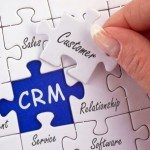Basics of CRM Success
-By Chris Fritsch, Client Success Consultant and Founder of CLIENTSFirst Consulting
What to Focus On

In working together with firms of all sizes on CRM projects, I have come to appreciate that there is no “one size fits all” for CRM success – either in terms of systems or functions. What is more important is to understand what you are trying to accomplish –the firm’s unique needs and goals– and then to fully evaluate all of the solutions that are available to see which can best meet those needs and goals. Ultimately, a CRM system should help your firm solve problems and automate processes.
It’s important to remember that CRM is about people, process and technology. When CRM systems failed to meet expectations in the past – and a significant number of them did – it was often due to the people and process issues rather than the technology. So to succeed with CRM, focus on people, processes and problems first, products second.
What is Essential?
Once you have finished with your internal assessment, you are ready to consider solutions. One of the ‘must haves’ is seamless integration with Outlook. Let’s face it, attorneys are busy. These people are balancing client demands – and sometimes demanding Clients – with critical deadlines and significant billable hour requirements, while being leg-ironed to their BlackBerrys and wading through a never-ending flood of e-mails. They will not adopt a system that requires them to change their business processes or sit in tedious training classes to learn new software.
But while attorneys may be averse to spending time ‘managing’ contacts in a new system, they live or die by their current systems for managing e-mail, calendars and contacts, primarily Outlook. In fact, for solos and very small firms, Outlook is often the primary – and sometimes the only – tool they use to manage their Client and contact relationships. As a result, any system that does not almost completely and seamlessly integrate with Outlook will not succeed in a law firm. This has been proven by the number of failed implementations of systems without this tight integration. This is also a reason to work with a CRM provider with experience in working with professional services firms and to select a system that has been built to accommodate their needs and processes.
Which System Should We Choose?
We are fortunate to have a number of knowledgeable CRM providers with specific professional services industry expertise including:
- Thomson Reuters Elite – 3E
- Cole Valley – ContactEase
- Versys – Intellipad
- InterAction – LexisNexis
- OnePlace (based Salesforce platform)
Two of these companies, ContactEase and InterAction, are leaders in their respective segments and have been providing Client relationship solutions for law firms for over a decade. The others are more recent contenders who seek to provide innovations in areas such as enhanced functionality, integration, ease of use and competitive pricing.
All the companies understand both the profession and the business of law and have excellent products and technology created and customized specifically to succeed in a law firm environment. Unlike non-legal CRM providers whose products may ‘sync’ with Outlook in order to move Outlook contacts into a separate system, their products truly integrate. For the attorney, this means accessing the core functionalities of CRM without leaving the Outlook environment. It also reduces the time and effort required for training. In fact, some firms have capitalized on this fact to brand their newly installed CRM system as simply the firm’s new version of Outlook.
What Will It Cost?
Despite some perceptions to the contrary, the pricing of professional service CRM providers is almost always lower than the pricing of providers outside the industry – often significantly lower. Additionally, the ongoing charges would likely be significantly lower. Professional services CRM providers have typically priced their systems either as an ongoing subscription or a one-time charge for software along with annual maintenance charges that are a percentage of the initial amount. There can also be additional charges for hardware associated with installed CRM systems, and for the professional services required for setup, installation and training, but these are typically one-time charges that are an investment to ensure that the CRM is configured to meet the firm’s specific needs. In contrast, it could be much more expensive to configure a CRM system that was originally designed to automate and facilitate the business practices and processes of companies and sales organizations in order to meet the unique needs of a law firm.
Where Will It Live?
Hosting is also a crucial element to consider in CRM selection. The preferred business model of many CRM providers outside the industry almost always involves hosting the system and data ‘in the cloud.’ This is a fluffy euphemism for on ‘a server someplace outside the firm.’ While this may be standard practice for other industries – and while it may even be more secure than hosting within the firm – firms so far have almost universally taken a pass when it comes to having their sensitive contact data reside outside the firm firewall.
What Should It Do?
Successfully selecting – and deploying – a CRM system requires separating the ‘must have’ functionality from the ‘bells and whistles.’ When evaluating systems and providers, it can be helpful to keep in mind that bells and whistles can be essential… but usually only on a bike or a train. For selecting a CRM system, focus instead on your firm’s need and goals.
One primary need that is almost always articulated by firms of all sizes is enhancing communication and coordination of mailings and events. I’ve often heard it said, “Our firm spent all of this money on a CRM system and all we got was a really expensive mailing list.” However, usually the person making this comment has never actually had to personally manage a law firm mailing list. Many firms do hundreds, or even thousands, of mailings each year. They are sent to thousands of contacts whose information changes frequently. In some firms this is compounded by the hundreds or thousands of attorneys who have relationships with these contacts and in some cases even act like they ‘own’ them. This is not a job that most people would volunteer for.
Fortunately, mailing list and event management is a core component of almost every CRM system. All of the systems have out-of-the-box functionality that allows attorneys or assistants to add contacts to mailing or event lists. The lists can then be incorporated into e-mails, invitations or other communications and then distributed.
The systems also allow firms to categorize and enhance information about contacts and to better segment them. For instance, a firm might want to define who their Clients – or top Clients are. They may want to identify a primary or multiple industries for Clients or prospects. They may want to enhance contact information with business or financial intelligence. Ultimately these fields or categories can also be searched to create lists and enhance targeted communication.
Additionally, there are external providers who offer enhanced e-mail communication and reporting functionality, as well as the ability to have e-mails delivered from an alternate domain in order to avoid issues with SPAM. These products should be evaluated by firms who do a significant number of mailings and events.
Who and What Do We Know?
As firms grow, both in numbers of attorneys and dispersed offices, the ability to identify and leverage connections becomes increasingly important – and more difficult. In addition, now more than ever, firms are being compelled to respond to a deluge of RFPs and are more frequently proactively pitching for new business. Because finding these core relationships can enhance the success of these business development efforts, the relationship intelligence or ‘who knows who’ functionality of CRM is often considered essential.
Additionally, as the complexity of the RFPs has intensified, they often require firms to tap into the depth of and breadth of their cumulative experience and expertise. CRM systems can provide a repository and access point for this type of information as well.
What Else?
As firms have grown, the level of sophistication of their approaches to business development has been growing as well. More than ever, firms of all sizes are experimenting with things like business development coaching or training, Client teams, alumni programs, Client interviews or Client service initiatives. What is common – and essential – to all of these initiatives is the need for communication and collaboration. CRM was designed to enable this type of communication and collaboration and it can be an excellent – even essential – tool for succeeding with these types of business development initiatives.
CRM systems allow users to share information and notes about Clients and prospects, add marketing and business development activities to records, enhance contacts with business or competitive intelligence, monitor or watch changes to selected contacts, attach relevant documents and even track business development opportunities. As firms grow more sophisticated in their approaches to business development – and CRM strategy – these are now moving from ‘nice to have’ features to ‘must haves.’
What Now?
Because trying to process this information about CRM can seem overwhelming, it can be helpful to keep a few things in mind:
- Don’t try to do everything. CRM can do a thousand things… that doesn’t mean that it should. Focus on your firm’s core needs and goals – initially the two or three that are most pressing and essential.
- Do something. Start by developing a CRM success plan strategy and plan. Assess your firm’s goals and needs. Get agreement, input and buy-in from key stakeholders. Then, as you execute your plan and achieve your goals, communicate successes and set a new goal. Repeat.
- Don’t do it alone. Don’t try to reinvent the wheel. There are plenty of great resources for CRM information and advice. Reach out to colleagues, industry organizations, CRM providers or consultants. You will find that most are willing to freely share information, ideas and best practices.
A Final Note on CRM Success
If at first you think that achieving CRM Success seems unattainable, perhaps you need to lower – or at least change – your expectations. While CRM has tremendous potential, when it fails to meet expectations, it usually isn’t the systems or the technology that are the problem. More often, the expectations are wrong.
In the past, people often mistakenly thought that CRM would be the answer to all of the firm’s problems with communication, collaboration and business development. While CRM is invaluable for enabling all of these things, it can only do so when firms are willing to commit the resources, make the changes and do the work that is required to take advantage of CRM’s potential.
So to achieve CRM Success, take your time and focus on the basics. As you master them you will be helping your firm achieve its goals and providing value to the attorneys, which ultimately is how CRM success should be defined anyway.
Download a PDF of the article here.
-For more than 10 years, the team at CLIENTSFirst Consulting has been helping Professional Services firms and other organizations successfully select and implement CRM and eMarketing systems to maximize value, adoption and return on investment. If you need help with CRM, eMarketing, Data Quality, Data Privacy Compliance or Client Intelligence, contact us at 404-249-9914 or [email protected].





Write a comment: